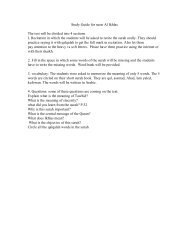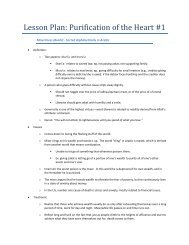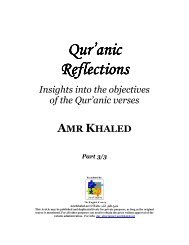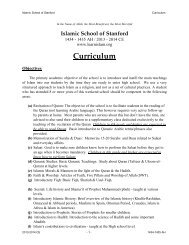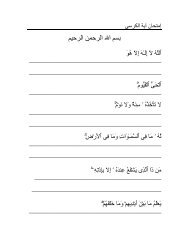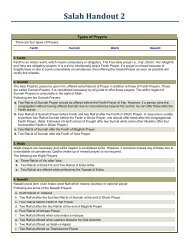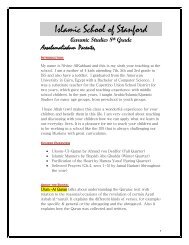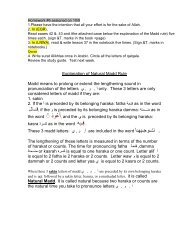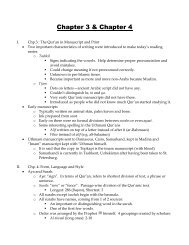Quranic Reflections - Islamic School of Stanford
Quranic Reflections - Islamic School of Stanford
Quranic Reflections - Islamic School of Stanford
Create successful ePaper yourself
Turn your PDF publications into a flip-book with our unique Google optimized e-Paper software.
what can be translated as, “And every man We have imposed on him his bird (<strong>of</strong><br />
augury) upon his neck, and “We will bring out for him, on the Day <strong>of</strong> the<br />
Resurrection, a Book (that) he will meet with, spread open. Read your Book!<br />
Your self suffices you this day as a constant-reckoner against you” (TMQ, 17:13–<br />
14).<br />
The Book is a major issue in the life <strong>of</strong> Muslims for if they do not read it, understand<br />
its essence, and apply it to their lives, what would they do with the Book <strong>of</strong> the<br />
afterlife<br />
The commandments <strong>of</strong> the Book<br />
As <strong>of</strong> the second quarter, the surah deals with the greatness <strong>of</strong> the Book, as it orders<br />
us to do what is necessitated by pure human intuition. Any man <strong>of</strong> sound judgment<br />
and pure nature, cannot, upon reciting the Qur'an, but admit its greatness. Among<br />
such commandments are:<br />
- Being dutiful to one’s parents; Allah (SWT) says what can be translated as,<br />
“And your Lord has decreed that you should not worship any except Him<br />
(only) and (to show) fairest companionship to parents; in case ever one or<br />
both <strong>of</strong> them reaches old age (Literally: being great “in years”) in your<br />
presence, do not say to them, “Fie!” nor scold them; and speak to them<br />
respectful words (Literally: say to them an honorable saying). And lower<br />
to them the wing <strong>of</strong> humbleness out <strong>of</strong> mercy and say, “Lord! Have mercy<br />
on them, as they reared me (when I was) small” (TMQ, 17:23–24).<br />
- Using money for the common good; Allah says what can be translated as, “And<br />
bring to a near kinsman his true (right) and (to) the indigent and the<br />
wayfarer; and do not squander wantonly (Literally: in “wanton”<br />
squandering). Surely the squanderers have been brethren <strong>of</strong> Ash-<br />
Shayâtîn (The all-vicious ones, i.e., the devils), and Ash-Shaytan has ever<br />
been ever-disbelieving to his Lord” (TMQ, 17:26–27).<br />
- Balancing miserliness and squandering; Allah (SWT) says what can be<br />
translated as, “And do not set up your hand shackled to your neck, (i.e., Do<br />
not be niggardly) nor outspread it widespread altogether, (Literally:<br />
outspread it all outspreading, i.e., do not be a spendthrift) for then you<br />
will sit blamed and regretfully rejected” (TMQ, 17:29).<br />
The call <strong>of</strong> intuition<br />
All <strong>of</strong> those are commandments that address a sound mind and a pure nature and no<br />
body can possibly disregard or desert them, especially that they are well-devised to<br />
serve the common good. Thus, Allah (SWT) says what can be translated as,<br />
- “And do not kill your children in apprehension <strong>of</strong> want; We provide<br />
for them and for you (too); surely the killing <strong>of</strong> them has been a great<br />
sinning” (TMQ, 17: 31).



